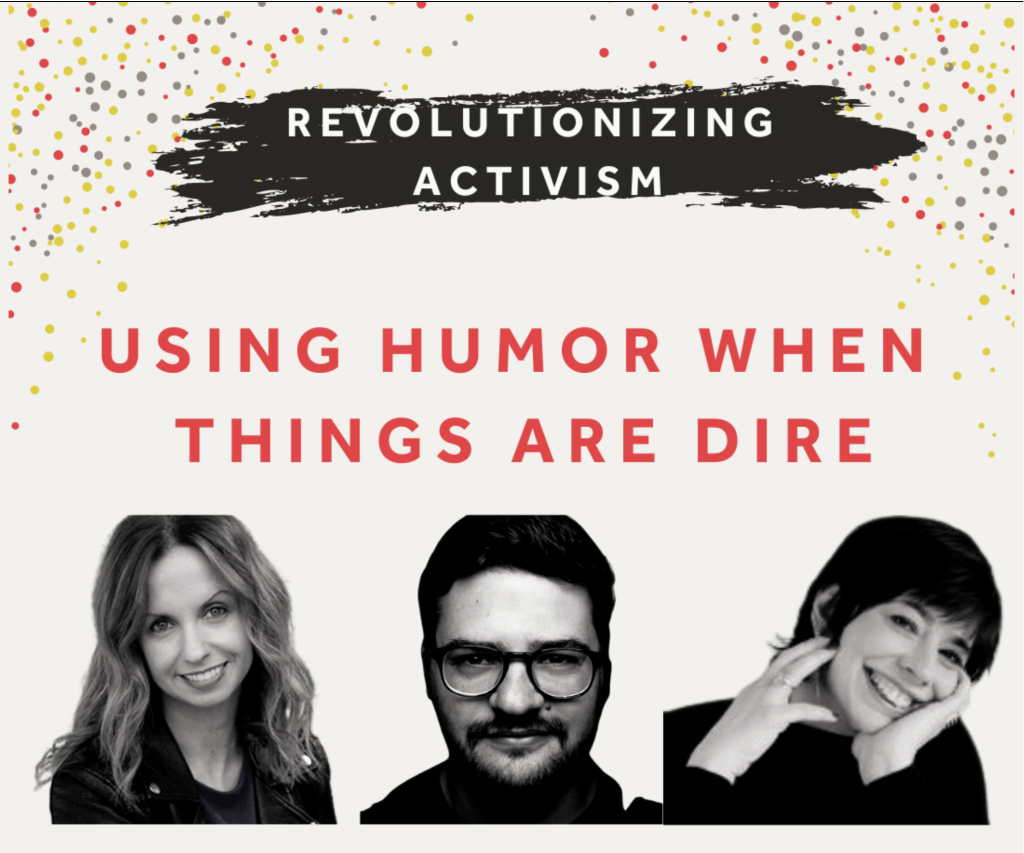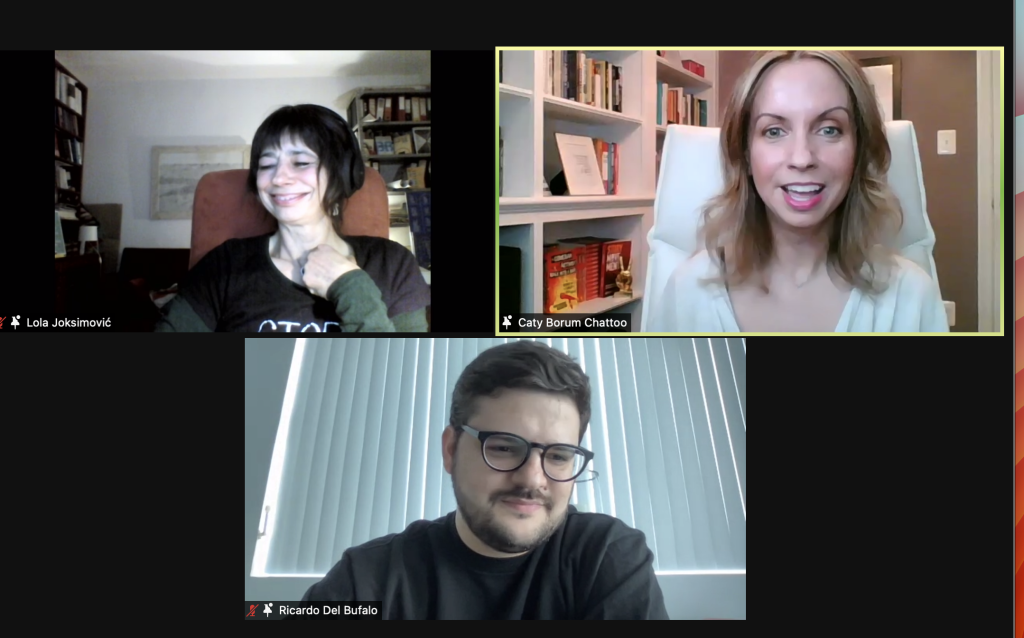
Our executive director Caty Borum recently moderated a panel discussion on how comedy can be used to inspire civic activism. Hosted by the Center for Artistic Activism, the webinar, “Revolutionizing Activism: Using Humor When Things Are Dire,” featured Venezuelan comedian and scriptwriter Ricardo Del Bufalo and Serbian human rights policy advocate Lola Joksimović.
Comedy as a Disruptor for Social Change
Invited to explore the essential nature of comedy as a cultural disruptor and galvanizer for social change, Borum kicked off the discussion by describing the long history of comedy in serving as a force for social change and civic power. As she examines in past research and in her upcoming book, The Revolution Will be Hilarious: Comedy for Social Change and Civic Power (NYU Press, 2023), research across disciplines establishes several ways humor works to help inspire social change. Humor:
- Provides listeners and viewers a safe entry into taboo topics
- Activates hope and optimism as motivating emotions that shift attitudes toward action
- Functions over time as a gateway to serious information
- Generates a memorable “sleep effect,” meaning people remember jokes and other comical content longer than they do serious messages
- Persuades through entertaining and stirring powerful emotions
Comedy as Civic Practice
Borum shared striking examples of comedy as civic practice, including the Sexual Assault Survivors’ Bill of Rights Act that Congress unanimously passed in 2016. Amanda Nguyen, a Harvard student who was raped in 2013, spearheaded an advocacy campaign to introduce federal legislation that would better protect survivors of sexual assault. After securing congressional support from New Hampshire Senator Jeanne Shaheen, Nguyen joined forces with the comedy website and TV production company, Funny or Die, to create a video to raise awareness for the campaign. The video garnered 100,000 change.org signatures in four days. Soon after, the bill was signed into law by President Barack Obama—the 21st bill in modern U.S. history to receive unanimous congressional support.
As Wired journalist Issie Lapowsky wrote in 2016 about Nguyen’s campaign: “There’s literally nothing funny about sexual assault. Not one thing. But in the digital age, humor sometimes can capture national attention—and spur action—more readily than serious efforts to elicit public support.”
Leveraging Comedy to Build Civic Power
Borum also shared examples of advocacy organizations like the National Domestic Workers Alliance, Everytown for Gun Safety, and Define American that use comedy to mobilize civic action around complex, often distressing issues such as labor exploitation, economic inequities, gun violence, and anti-immigrant policies. Comedy is an effective medium for moving people from inaction to action because it:
- Humanizes those who are “othered” in mainstay media narratives
- Mobilizes a base that is often exhausted by doom-and-gloom rhetoric
- Energizes and attracts new supporters
- Responds to the human need for optimism
Ricardo Del Bufalo, Comedian
 Guest panelists Ricardo Del Bufalo and Lola Joksimović echoed these themes. Emphasizing that comedy wins hearts in part because people are disaffected by divisive politics and rhetoric, Venezuelan comedian Del Bufalo described the ways he uses comedy across multiple platforms to shed light on serious issues. For instance, he produces web show edutainment videos, which he views as a “cool” way to reach Gen Z and Pandemials (a young person old enough to be conscious of the full impact of COVID-19 on their lives, but not old enough to remember life before 9/11). He leverages podcasts to gain access to and have light-hearted conversations with human rights leaders. He also creates comedy sketches—short documentaries and informative videos—as well as satirical memes to call indirect attention to controversial topics.
Guest panelists Ricardo Del Bufalo and Lola Joksimović echoed these themes. Emphasizing that comedy wins hearts in part because people are disaffected by divisive politics and rhetoric, Venezuelan comedian Del Bufalo described the ways he uses comedy across multiple platforms to shed light on serious issues. For instance, he produces web show edutainment videos, which he views as a “cool” way to reach Gen Z and Pandemials (a young person old enough to be conscious of the full impact of COVID-19 on their lives, but not old enough to remember life before 9/11). He leverages podcasts to gain access to and have light-hearted conversations with human rights leaders. He also creates comedy sketches—short documentaries and informative videos—as well as satirical memes to call indirect attention to controversial topics.
He urged webinar participants to focus on telling funny, engaging stories rather than on over-sharing data. Working with social media managers who follow and understand social media trends on dominant platforms like TikTok is also important to ensure content is relevant and resonant with each platform’s audience.
Lola Joksimović, Advocate
European human rights policy advocate Lola Joksimović from the Borderline Offensive shared how her boredom with traditional cultural projects spurred her to branch out into “what really works for us,” finding, “if it’s not fun, it won’t work.”
Under the Laughing in the Face of Fear platform, the Borderline Offensive works with European and Middle Eastern artists to explore migration, intercultural conflict, collective identity-building, and community cohesion in contemporary Europe by advancing artistic research and art-based societal development. The organization arranges residencies for activists around the world, using humor and the participatory arts to inspire interaction, dialogue and cooperation between migrant and host communities.
Does Comedy Minimize Serious Issues?
Panelists fielded questions from webinar participants, including the common misconception that comedy diminishes serious subjects. Borum noted that the science of why we laugh at a joke is the science of incongruity: To make someone laugh, one has to find the absurd. Meanwhile, social justice requires us to see a situation through a different lens. Comedy, which spotlights the absurd, functions as this lens. Often, the most powerful way to confront a serious issue is to pivot to the unexpected. Also, people are far more likely to remember a joke than a weighted, humorless statement: Funny messages are better heard.
Fearlessness in Unsafe Environments
Like journalists, comedians are often attacked, particularly when they live and work in authoritarian environments. How do comedians in these situations creatively mitigate against the risks of their work? One approach is to use subtext and implication rather than direct commentary — finding a way to say what you have to say without explicitly saying it. Another is to carefully review scripts, images and videos to ensure that the content does not inadvertently violate laws.
In closing, the group shared several resources for advocates who want to integrate comedy into their work. Many thanks to the Center for Artistic Activism for hosting this insightful and inspiring discussion!
_____________________
RESOURCES
Al Hassan, S., & Kraft van Ermel, I. (2020). Gaming in the Face of Fear. Borderline Offensive. https://borderlineoffensive.eu/portfolio-gaminginthefaceoffear
Borum, C., & Feldman, L. (2020). A comedian and an activist walk into a bar: The serious role of comedy in social justice. University of California Press.
Borum, C. The revolution will be hilarious: Comedy for social change and civic power. Due for release in early 2023 through New York Press.
Breen, N., & Sciulli, C. (Directors). (March 10, 2022). Chase the erase [Film]. Center for Artistic Activism.
Center for Artistic Activism. (March 31, 2022). “Revolutionizing Activism: Using Humor When Things are Dire” [Video]. YouTube. https://www.youtube.com/watch?v=q8Wn3Rw_ktI
Damir-Geilsdorf, S., & Milich, S. (Eds.). (2020). Creative resistance: Political humor in the arab uprisings. Columbia University Press.
Duncombe, S., & Lambert, S. (2021). The art of activism: Your all-purpose guide to making the impossible possible. OR Books.Jones, J. (2009). Entertaining politics: Satiric television and political engagement (2nd edition). (R.E. Denton, Jr., Ed.). Rowman & Littlefield Publishers, Inc.
